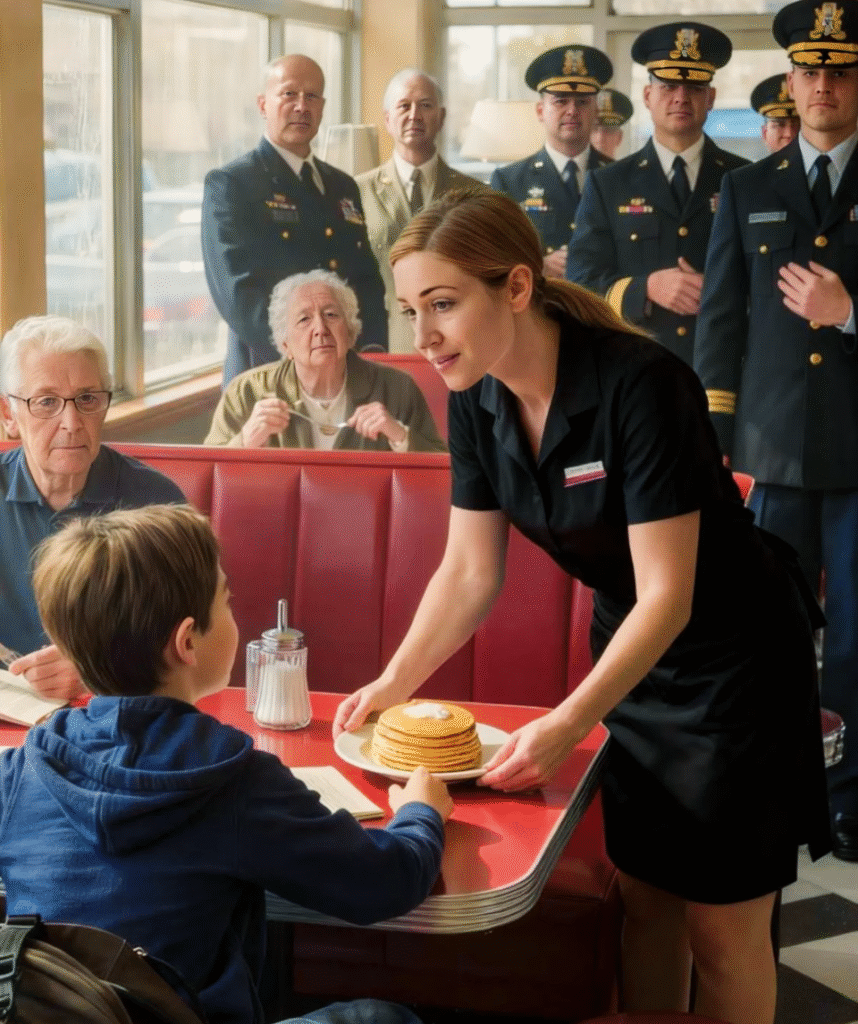Jenny Millers, twenty-nine, worked at Rosie’s Diner, a modest little spot tucked between a hardware store and a laundromat in rural Kansas. Her life followed the same rhythm every day: rise before dawn, walk three blocks to the diner, tie on her faded blue apron, and greet the morning regulars with a practiced smile. Behind that smile, however, lay a quiet loneliness.

She lived alone in a small apartment above the pharmacy. Her parents had died when she was a teen, and the aunt who raised her had moved to Arizona years ago. Aside from the occasional holiday phone call, she kept mostly to herself.
The Boy in the Booth
One October morning, she noticed him for the first time — a small boy, maybe ten, sitting in the booth farthest from the door. A book lay open before him, a backpack far too large for his thin frame.
The first day, he ordered only a glass of water. Jenny brought it with a smile. He nodded but didn’t look up. The next day was the same. By the end of the week, she realized he came every day at 7:15 a.m., stayed forty minutes, then left for school without touching a single bite of food.
On the fifteenth day, Jenny placed a plate of pancakes in front of him.
“Oh, the kitchen made an extra,” she said casually. “Better you eat it than let it go to waste.”
Hesitation flickered in his eyes. Ten minutes later, the plate was gone.
“Thank you,” he whispered when she returned.
It became a quiet ritual — pancakes, eggs, toast, or oatmeal on colder mornings. He never explained, never asked. He simply ate.
Warnings and Doubts
“Who’s that boy you keep serving?” Harold, a retired postman, asked one morning.
“I don’t know,” Jenny said softly. “But he’s hungry.”
Kathy, the cook, warned her, “You’re feeding a stray. One day he’ll vanish, and it’ll be your problem.”
Jenny only shrugged. “I remember being hungry too.”
Some regulars noticed — not kindly.
“Playing charity worker on company time?”
“Kids today expect handouts.”
Jenny stayed quiet. She’d learned long ago that kindness rarely changes bitter hearts.
When Mark, the manager, confronted her, she didn’t back down.
“I’ll pay for them,” she said.
“From your tips? Those barely cover rent.”
“It’s my choice,” she insisted.
From then on, she slipped part of her tips into the register every morning to cover the boy’s meal.
The Disappearance
Then one Thursday, he didn’t show.
Jenny set a plate at his usual booth, but he never came.
A week passed. Then two. By the third week, she felt an ache she couldn’t explain. She didn’t even know his name, yet the emptiness he left was tangible.
Online, a photo of the empty booth went viral, mocking: “Rosie’s Diner serving food to invisible kids.” The comments were cruel. For the first time, Jenny questioned herself.
That night, she opened a box of keepsakes from her father, an Army medic. One journal entry read:
“Shared half a ration with a boy today. Hunger is the same everywhere. No one becomes poor by sharing a loaf.”
His words steadied her. Kindness, unconditional, is never wasted.
The Arrival
On the twenty-third day, everything changed.
At 9:17 a.m., four black SUVs with government plates rolled into the lot. Uniformed men stepped out with precise coordination.
The lead man entered the diner — tall, in full Army dress uniform.
“Can I help you?” Mark asked nervously.
“We’re looking for Jenny Millers,” the officer said.
Jenny stepped forward.
“I’m Jenny,” she said, setting down her coffee pot.
“I’m Colonel David Reeves, United States Army Special Forces,” he said. “I’m here because of a promise made to one of my men.”
He paused, then spoke softly:
“The boy you’ve been feeding — his name is Adam Thompson. His father was Master Sergeant James Thompson, one of the best soldiers under my command. While deployed, Adam came here every morning. His mother had left, and he was alone, too proud to ask for help.”
Jenny’s breath caught.
“Is Adam alright?”
“Safe with his grandparents,” the Colonel said. “But your kindness gave him dignity during a time no child should face alone. Sergeant Thompson wanted me to thank the woman who never asked questions and never turned him away.”
He handed her a letter. Tears streamed down Jenny’s face.
The Colonel saluted her. Every soldier followed. Even the diners rose quietly in respect. For the first time, Jenny — the quiet waitress — was at the center of honor.
Legacy of Kindness
Rosie’s Diner commemorated Adam’s booth with a plaque:
“Reserved for those who serve — and the families who wait.”
Veterans and military families left notes, coins, and tokens of gratitude. Tips grew generous, often with messages: “Thank you for reminding us what matters.”
One day, Jenny received a letter from Adam:
“Dear Miss Jenny,
I didn’t know your name until that day. But every morning, you made me feel seen. Dad always said heroes wear uniforms, but I think sometimes they wear aprons too. Thank you.
Your friend, Adam Thompson”
She framed it behind the counter.
Months later, a Special Forces challenge coin appeared on the counter, engraved: Semper Memor — Always Remembering.
Mark, once skeptical, now matched donations for military families. A new sign went up in the diner:
“Whoever you are. Whatever you can pay. No one leaves hungry.”
Jenny smiled as she walked home, thinking of Adam with his grandparents.
Even in the darkest times, kindness survives. And every act — no matter how quiet — truly matters